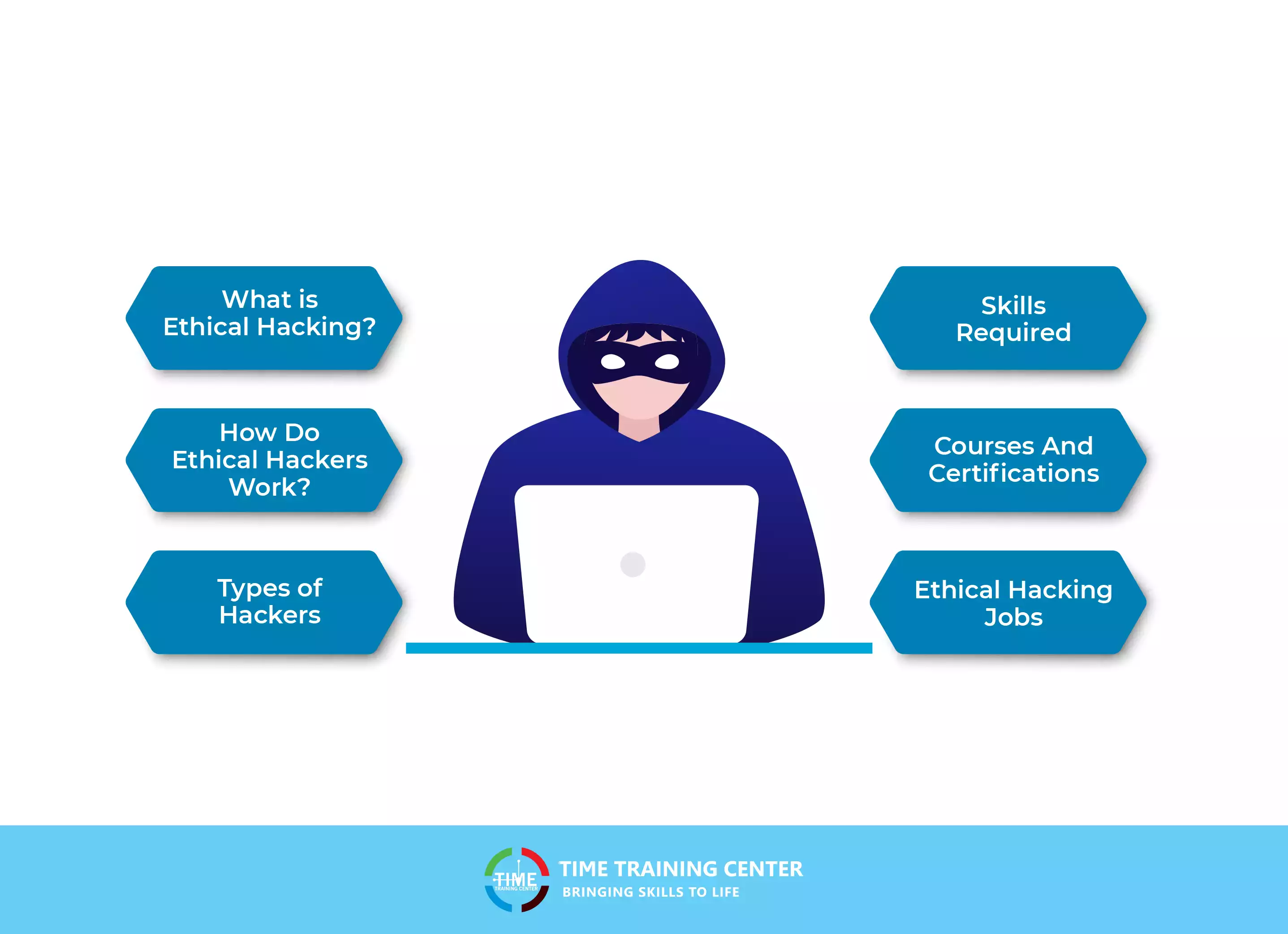The term "Hacker" was used to refer to professionals who redeveloped mainframe systems, boosting their productivity and enabling multitasking. They contribute to strengthening an organization's security posture through their proactive activities. The goal of ethical hacking is different from malicious hacking because it is done with permission from the organization or owner of the IT asset.
One of the most in-demand positions in cybersecurity is an ethical hacker. Businesses lose millions of dollars annually due to ransomware attacks, compromised networks, and information security flaws. Before the "bad guys," ethical hackers assist these firms in identifying vulnerabilities and covert shortcomings.
Understanding and being familiar with ethical hacking entails exploring the minds and methods of hackers and understanding how to infiltrate through assessing and discovering flaws in software and computer networks.
What is Ethical Hacking?
Penetration testing, often known as ethical hacking, is the practice of lawfully breaking into computers and other electronic devices to look for dangers and flaws that a malicious attacker would use to steal data, cause financial loss, or cause other serious harm. They can enhance security to better withstand attacks or deflect them.
An ethical hack entails copying the tactics and behaviors of hostile attackers. This method is planned, approved, and—more importantly—legal, in contrast to malicious hacking.
How Do Ethical Hackers Work?
There seems to be a widespread misperception that the sole duty of an ethical hacker is to carry out system and application penetration tests. An ethical Hacker also utilises social engineering techniques and carries out other duties as well. Moreover, they perform these tasks as well;
-
Examining businesses or organizations through a rigorous vulnerability analysis.
-
Ethical hackers also use techniques such as sniffing networks, getting around and breaking wireless encryption, and taking over web servers and web applications.
-
Work on setting up secure networks to thwart security breaches Preventing hostile attackers from accessing and stealing confidential data.
-
Assist businesses in gaining the confidence of clients and investors by protecting data and resources.
Types of Hackers
Hackers are not identified by their choice of hat, despite the "hat" symbolism. The various categories of hackers are broken down as follows:
-
White Hackers
-
Black Hackers
-
Grey Hackers
White Hat hacking is the term for ethical hacking, and White Hat hackers are individuals who engage in it. A white-hat hacker is a cybersecurity expert hired to identify attackable flaws in software, hardware, and networks, report on those flaws, and frequently assist in securing such weak points.
"Black Hat" hacking, in contrast to ethical hacking, refers to actions that violate security. Black Hat hackers compromise systems or destroy data using illicit methods. The criminals are the black-hat hackers. They have a reputation for hacking into victims' networks unlawfully to disrupt operations, steal or destroy data, conduct espionage, or occasionally just cause malicious mayhem to show off their abilities.
The characteristics of both white- and black-hat hackers are combined in the grey-hat hacker. "Grey Hat" hackers enter your system without your consent. But another way that Grey Hats vary from Black Hats is that they don't engage in hacking for their own or other people's gain. All they do is for pleasure.
Also read, What is Cybersecurity And Its Importance?
Skills Required to Start an Ethical Hacking Career
To carry out hacking effectively, an ethical hacker needs to have a thorough understanding of all systems, networks, program codes, security measures, etc. They frequently specialize in one particular aspect of the ethical hacking field, becoming subject matter experts (SME). The few skills are as follows:
-
Proficiency with scripting languages.
-
Programming expertise and in-depth networking Knowledge
-
A strong basis in information security principles.
-
Knowledge of databases (SQL)
-
Understanding of several platforms, including Windows, Linux, Unix, etc.
-
Understand the stages and techniques of ethical hacking
However, there are courses and certifications you can obtain to give you an edge as you pursue your ethical hacking career. Additionally, they can help you upgrade your ethical hacking skills, which will benefit you in future endeavours.
Check Out: Career Benefits of Ethical Hacking
Courses and Certifications in Ethical Hacking
Professional qualifications are important in the job market for ethical hackers. Although further education is not necessary for all professions in cybersecurity, many firms demand or prefer candidates with master's degrees. However, if you already possess these credentials, you may be able to secure a respectable position. Listed below are some of the courses and credentials you can choose from if you want to pursue a career in cybersecurity.
Also read, Top Ethical Hacking Certifications
Ethical Hacking Jobs
Almost all private, public and governmental organizations use ethical hackers. Financial institutions like banks, credit card firms, lenders, and payment processors are some of the career options for ethical hackers.
-
Ecommerce platforms
-
SaaS businesses
-
Companies that use cloud computing and data centers
-
Authorities from the local, state, and federal levels
-
Media and entertainment companies
In addition to this, you have the opportunity to work for the military and highly classified intelligence-gathering organizations. This gives you a comprehensive view of the various fields or facets in which you can work. Jobs in ethical hacking can be found both independently and as a component of other IT security roles. The positions are as follows:
-
Information security analyst,
-
Vulnerability Assessor -Penetration tester
-
Safety Analyst
-
Certified Ethical Hacker (CEH)
-
Ethical Hacker
-
Security Consultant (Information Technology, Computing, and Networking)
-
Engineer/Architect for Security
-
Instance Security Manager
How Much Money Does an Ethical Hacker Make?
Because figures are sometimes changed in real-time based on changing data, salary estimates for cybersecurity occupations connected to ethical hacking vary widely depending on the methodology utilized. An ethical hacker's salary in the UAE ranges from 9,010 AED to 25,200 AED per month. Of course, you can earn more than this if you are proficient in this cybersecurity industry.
Conclusion
Given that it necessitates a thorough understanding of every component of a system or network, ethical hacking is a complex field to study. This is why using the right skills to carefully and successfully traverse its processes is necessary. Ethical practices offer a powerful way to get rid of cyber dangers since they don't just halt them; they also block them from happening in the first place. Businesses are vulnerable to cyberattacks and the growth of technology has made it necessary for businesses to hire cybersecurity experts to protect their data. IT security courses will be and will always be in demand. It is definitely a rewarding career path to pursue.
You May Also be Interested in: Top Cybersecurity Software Tools
 +971 2 6713828
+971 2 6713828




